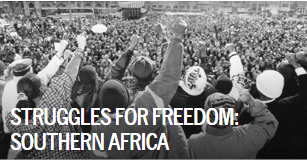|
|
JSTOR News
| the importance of studying censorship and banned books |
| Banned Books Week is an annual tradition started in 1982 by library activist Judith Krug and the American Library Association. It serves to defend the freedom of expression and the right to read about any subject, including unorthodox and unpopular viewpoints.
Celebrated by libraries and schools across the world, Banned Books Week is also a reminder of the dangers of censorship and how challenged books—like Huckleberry Finn, The Catcher in the Rye, Beloved, and even Harry Potter—often go on to become classics that shape a generation.
The JSTOR archive has thousands of journal articles studying banned books, plus scholarly ebooks on censorship, and primary source magazines/books that were once banned. See below for a sample of content surrounding this important topic. And please feel free to contact us with any content access questions you may have. |
|

| Investigate with JSTOr Daily |
| JSTOR's scholarly news magazine, JSTOR Daily, publishes insightful pieces that tap into JSTOR's growing library of scholarship (each post provides readers with free access to articles in the JSTOR archive). Check out the stories below on censorship, and be sure to sign up for JSTOR Daily's email newsletter for a weekly digest of smart takes on today's news and issues. |
|
|
|
What's Copernicus's hair got to do with banned books?
Copernicus had been dead for 73 years when the Catholic Church listed his scientific writings on its index of banned books. His theory of a heliocentric universe was beginning to have an effect. But his book contained more than just blasphemous ideas...
Read more. |
| Books on banned books |
| What's more appropriate than reading books on banned books? The Books at JSTOR program has grown to include more than 45,000 DRM-free ebook titles—including the below—from 130+ scholarly publishers. Contact us to learn more. |
Stolen Words: The Nazi Plunder of Jewish Books
Mark Glickman | University of Nebraska Press
"This book is a must-read for every Jewish library and every university library as well."
—Philip K. Jason, Jewish Book Council
"Readers will come away with a valuable perspective on how the written word can be abused for the sake of cultural genocide."
—Kirkus |
|




| primary sources Once Censored |
 |
| Struggles for Freedom: Southern Africa supports research related to black history and the culture of Africa and its diasporas by providing access to documents from the anti-Apartheid movement in South Africa. Users can get a firsthand look at publications and papers that were once banned in sub-collections like:
- Mozambique Revolution: Mozambique Revolution was an underground publication about Portuguese rule in Mozambique. Run secretly by the Mozambique Liberation Front (FRELIMO), the periodical contained news on the struggle for independence, including updates on the armed struggle that began in September 1964.
- My Fight Against Apartheid: This once-banned autobiography tells a story about the life of Botswana-born Michael Dingake, who joined the African National Congress in the 1950s. His story takes us from his childhood days in Botswana, to his underground work for the ANC in the early 1960s and his kidnapping, arrest, and imprisonment alongside Nelson Mandela.
Reach out to us if you'd like your library to provide access to this unique and ever-growing primary source collection on black history and freedom. |
|

| Want Access? |
| We're often adding new content, especially in literature and art, to the JSTOR platform, which means that some institutions don't subscribe to everything available on JSTOR. Contact us for more information on adding new collections to your library.
|
|
|
|
|
|
|
|
|